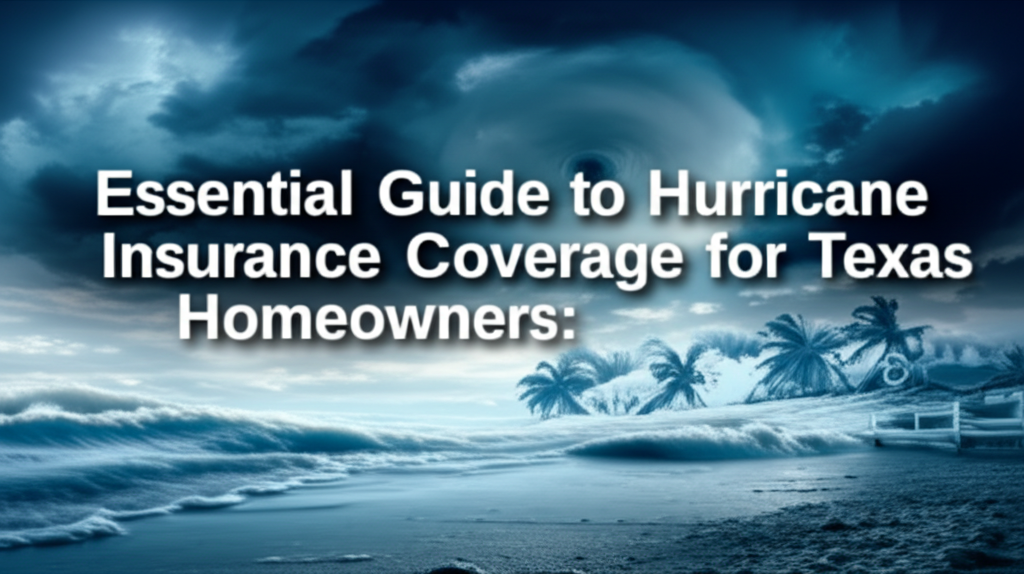When hurricane season rolls around in Texas, homeowners often feel a mix of anxiety and concern. With the state being a prime target for powerful storms, understanding how to protect your property is crucial. One of the most effective ways to do this is through hurricane insurance coverage. But what does that entail? This essential guide aims to demystify hurricane insurance for Texas homeowners, providing you with the knowledge needed to safeguard your property against nature’s wrath.
So, why is hurricane insurance so important? Well, hurricanes can cause extensive damage to homes, leading to costly repairs and even the loss of personal belongings. Regular homeowners insurance often doesn’t cover hurricane-related damage, leaving many in a precarious situation when a storm strikes. By the end of this guide, you will understand the different types of hurricane insurance, key components of coverage, the benefits it provides, and practical steps you can take to ensure your home is well-protected. Let’s dive in!
Understanding Hurricane Insurance Coverage
Hurricane insurance is a specialized form of property insurance tailored to cover the unique risks associated with hurricanes. Unlike standard homeowners insurance, which typically covers a range of hazards, hurricane insurance focuses specifically on wind damage and flooding, two of the most common consequences of a hurricane.
What Does Hurricane Insurance Cover?
Hurricane insurance generally includes coverage for:
- Wind Damage: This covers damage caused by high winds, including broken windows, roof damage, and structural issues.
- Flood Damage: Flooding is often a result of heavy rains and storm surges. Standard policies may not cover this, so specific flood insurance is crucial.
- Additional Living Expenses (ALE): If your home becomes uninhabitable, this coverage can help pay for temporary living arrangements.
Types of Coverage
In Texas, homeowners can obtain hurricane insurance through various avenues:
- Homeowners Insurance with Hurricane Endorsement: This policy adds hurricane coverage to your existing homeowners insurance.
- Stand-Alone Hurricane Policy: A specialized policy focusing solely on hurricane-related damages.
- Flood Insurance: Often required in flood-prone areas, this insurance covers damages from flooding, including those caused by hurricanes.
Key Components of Hurricane Insurance
Understanding the key components of hurricane insurance can help you make informed decisions about what coverage you need. Here are some crucial aspects to consider:
Deductibles
Most hurricane insurance policies come with high deductibles, especially for wind and hail damage. In Texas, deductibles can range from 2% to 5% of your home’s insured value. For example, if your home is insured for $300,000 and your deductible is 3%, you would need to pay $9,000 out-of-pocket before your insurance kicks in.
Coverage Limits
Every policy has coverage limits, meaning the maximum amount your insurer will pay for damages. Ensure your limits are adequate to cover both structural repairs and personal property replacement. Review your policy regularly, especially after home improvements or major purchases.
Exclusions
Familiarize yourself with what isn’t covered. For example, most hurricane insurance policies exclude damages caused by poor maintenance or wear and tear. Understanding these exclusions can prevent unpleasant surprises during the claims process.
Benefits and Importance
Securing hurricane insurance offers several benefits that go beyond mere peace of mind:
Financial Protection
One of the most significant advantages of hurricane insurance is financial protection. The costs associated with hurricane damage can be astronomical, often exceeding tens of thousands of dollars. Having the right coverage ensures that you are not left to bear these costs alone.
Peace of Mind
Knowing that you have protection in place can alleviate anxiety during hurricane season. You can focus on preparing your home and your family rather than worrying about potential financial ruin.
Quick Recovery
In the aftermath of a hurricane, having insurance can expedite the recovery process. With the right coverage, you can quickly start repairs on your home, minimizing the disruption to your life and helping you return to normalcy sooner.
Practical Applications
Now that we’ve covered the essentials, let’s discuss practical steps you can take to ensure your home is adequately protected against hurricanes.
Assess Your Current Coverage
The first step is to review your existing homeowners insurance policy. Check if hurricane coverage is included and what specific risks your policy addresses. If you find gaps in your coverage, reach out to your insurance agent to discuss your options.
Consider Additional Coverage Options
Depending on your home’s location and vulnerability, you may want to consider additional coverage. This could include:
- Flood Insurance: Essential for homes in flood-prone areas.
- Windstorm Insurance: Some insurers offer this as a separate policy, particularly in coastal regions.
Prepare for the Worst
Preparation goes a long way in minimizing hurricane damage. Here are some tips:
- Secure Your Home: Install storm shutters, reinforce your roof, and secure outdoor belongings.
- Have an Emergency Kit: Keep supplies like water, food, flashlights, and first-aid kits ready.
- Create a Family Plan: Have a plan for where to go and how to stay in touch in case of evacuation.
Frequently Asked Questions
What is hurricane insurance?
Hurricane insurance is a specialized type of property insurance that provides coverage for damages caused by hurricanes, including wind damage and flooding. Unlike standard homeowners insurance, it focuses specifically on the risks associated with hurricanes, making it essential for homeowners in hurricane-prone areas like Texas.
Do I need hurricane insurance if I live inland?
While homeowners living inland may feel less vulnerable to hurricanes, flooding can still occur due to heavy rains and storm surges. It’s essential to assess your risk and consider purchasing flood insurance, even if hurricane insurance might not seem necessary.
How much does hurricane insurance cost?
The cost of hurricane insurance can vary significantly based on factors such as your home’s location, age, value, and the type of coverage you choose. On average, homeowners can expect to pay anywhere from a few hundred to several thousand dollars annually for this insurance. It’s wise to get quotes from multiple insurers to find the best deal.
What should I do if I need to file a claim?
If you need to file a claim after a hurricane, follow these steps:
- Document the Damage: Take photos and make a list of all damaged items.
- Contact Your Insurer: Notify your insurance company as soon as possible to start the claims process.
- Keep Records: Maintain detailed records of all communications, expenses, and repairs related to the claim.
Are there any exclusions to hurricane insurance?
Yes, most hurricane insurance policies have exclusions. Common exclusions include damage resulting from neglect or lack of maintenance, certain weather events like earthquakes, and damages caused by flooding unless specifically covered by a separate flood policy. Always read your policy carefully to understand what is and isn’t covered.
How can I lower my hurricane insurance premium?
There are several strategies to lower your hurricane insurance premium, including:
- Increasing Your Deductible: Opting for a higher deductible can lower your premium.
- Implementing Mitigation Measures: Making your home more hurricane-resistant can qualify you for discounts.
- Shopping Around: Compare quotes from different insurers to find the best coverage at the lowest price.
Conclusion
In conclusion, hurricane insurance is a vital component of home protection for Texas homeowners. With the potential for devastating storms, understanding your coverage options, key components, and the steps you can take to safeguard your property is essential. By assessing your current insurance, considering additional coverage, and preparing your home and family for the worst, you can ensure that you are ready when hurricane season arrives.
Don’t wait until a storm is looming on the horizon! Take action today by reviewing your insurance policy, exploring coverage options, and preparing your home. Remember, when it comes to protecting your property, knowledge is power. If you have any questions or need assistance, don’t hesitate to reach out to a trusted insurance agent. Stay safe and protect what matters most!


